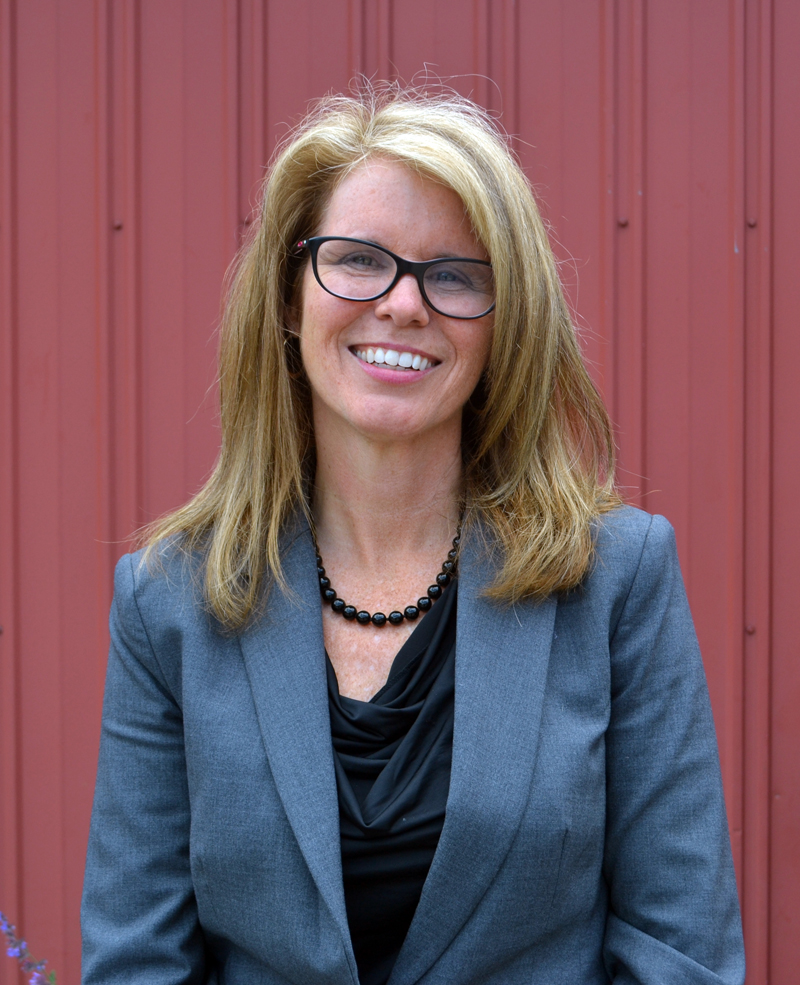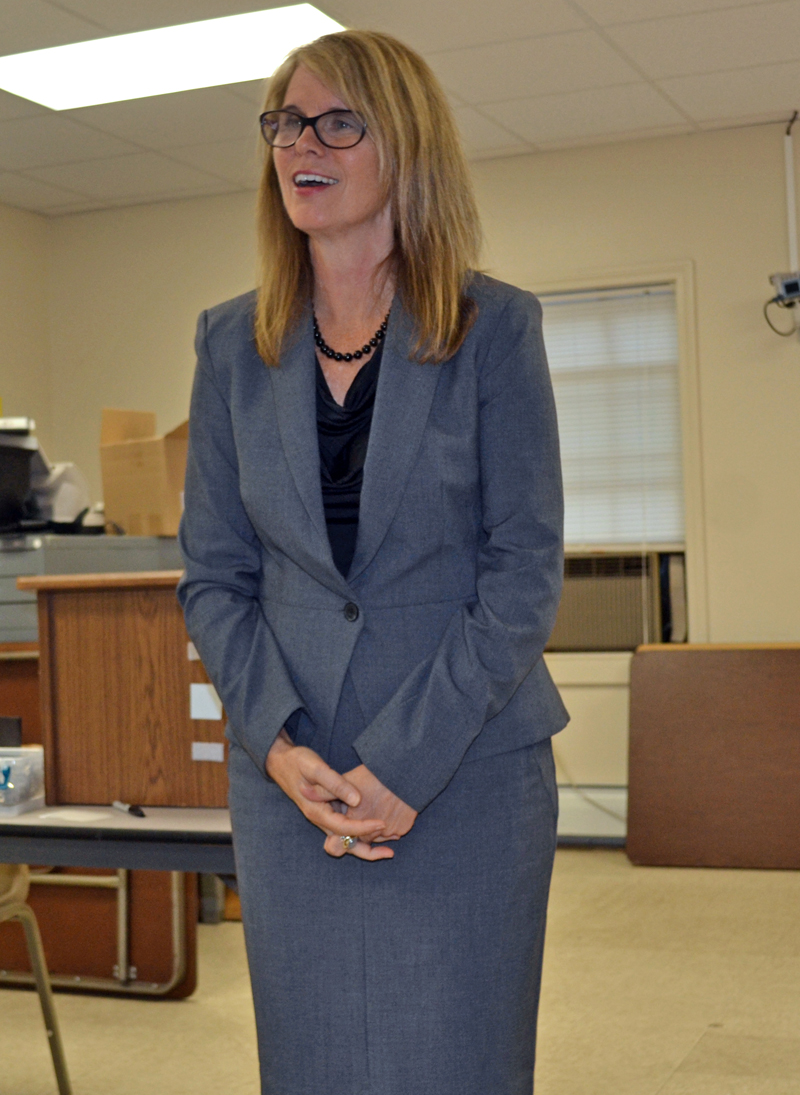
Mary Mayhew (Maia Zewert photo)
Calls of “Mayhew 2018” and “Let’s elect Mayhew” came from the crowd that gathered Wednesday, June 28 to hear gubernatorial candidate Mary Mayhew speak to the Lincoln County Republican Committee in Newcastle.
It was the second campaign stop for Mayhew in Lincoln County that day. Earlier, she had marched in the Windjammer Days parade in Boothbay Harbor – her first parade as a candidate for elective office. “I’m so excited to be in this race,” Mayhew said.
The former Maine health and human services commissioner resigned in May to seek the Republican nomination for governor in 2018. Mayhew intends to “protect what (the LePage administration) has accomplished and continue to build on it,” she said.
Mayhew will continue to fight for LePage’s goals to eliminate the state income tax, decrease energy costs, and create a business-friendly environment in Maine, as well as to continue welfare reforms, she said.
During her tenure as commissioner, Mayhew has “been called every name in the book,” she said. The personal and professional attacks will continue and “the battle (for governor) will be fierce,” she said.
However, Maine now stands as a national leader on health care policy and welfare reform, Mayhew said. She has received a flood of requests from Republicans in the U.S. House of Representatives, national media outlets, and industry leaders “who want to know how we did it,” she said.
The Maine Department of Health and Human Services was “hemorrhaging red ink” when she assumed the role of commissioner and was in a constant state of fiscal crisis, Mayhew said. Tough decisions were made, “but they were the right decisions,” she said.
The department no longer depends on emergency funding from the Legislature, has reduced waste, is able to anticipate trends in health care, and has increased support to Maine’s most vulnerable citizens – the elderly and the disabled, Mayhew said.
States experiencing budget shortfalls due to Medicaid expansion, such as Oregon, are looking to Maine and to the reforms instituted at DHHS as an example, Mayhew said. “It would have been far easier to manage the status quo,” she said, “but it was far more important to say ‘I believe in better.’”
Maine needs a leader with “the courage to make tough decisions,” Mayhew said. It will take “a lot of hard work” to prevent the rollback of recent reforms, she said. “I’m willing to fight for Maine’s future,” she said.
Mayhew was born in Pittsfield, the youngest of four children. The family moved to Arkansas when she was 15 to care for her mother’s aging parents.
From an early age, Mayhew was drawn to government and policy debates. She worked as a congressional page and completed high school in Washington, D.C. through the now-defunct Congressional Page School.
At 17, Mayhew worked as a liaison to Speaker of the House Tip O’Neill. President Ronald Reagan was in attendance at her graduation on Capitol Hill.
Mayhew would go on to work as a legislative assistant to U.S. Rep. Bill Alexander, D-Ark., and as a lobbyist for Equifax, the consumer credit reporting firm, before returning to Maine.
Mayhew, who now lives in China, Maine, returned to her home state in 1990 to run Democratic challenger Patrick McGowan’s congressional campaign against then-U.S. Rep. Olympia Snowe, R-Maine. McGowan lost by a narrow margin; it was one of the closest races in Snowe’s congressional career.
Mayhew was 25 at the time. She would go on to work for the Maine Hospital Association as vice president of government affairs and communication, a career path she chose to develop in-depth experience in the health care field, and contribute to the debate around health care policy as a lobbyist, she said.
Mayhew was tapped by Gov. Paul LePage in 2011, initially as a health policy adviser, but was quickly appointed commissioner of health and human services.
While Mayhew’s initial forays into the political world were as a Democrat, she is now a staunch advocate of the Republican principles of less government, lower taxes, and deregulation.
“People ask me what changed,” Mayhew said of her switch to the Republican Party. She enrolled as a Democrat because it was her father’s party. “The party left him and it left me a long time ago,” she said.
Democrats and Republicans share many of the same goals, but have different pathways to helping people, Mayhew said. Economic opportunity and gainful employment are the keys to helping citizens in need, not growing government and “exacerbating dependency on welfare,” she said.
Entitlement programs have “discouraged people from working and trapped people in poverty. They’ve taken the American dream and transformed it into a nightmare of poverty and despair,” Mayhew said.
“True compassion” for people in need is shown by giving them education, skills, and employment opportunities so they can return to the workforce, earn a paycheck, and live with the self-worth and dignity that comes from supporting oneself, Mayhew said.
Strengthening work requirements and setting time limits on Temporary Assistance for Needy Families were among the first reforms Mayhew instituted during her time as commissioner. The federal government had required the stricter standards since the welfare reforms of the Clinton Administration in the mid-1990s, but Maine never adopted them.
Mayhew made the “tough decision” to establish a time limit and transition people off the benefit, she said. She became the subject of widespread criticism as a result, she said.

Gubernatorial candidate Mary Mayhew addresses the Lincoln County Republican Committee in Newcastle on Wednesday, June 28. (Abigail Adams photo)
“I’ve been characterized as Marie Antoinette,” she said, the last queen of France before the French Revolution, infamous for supposedly saying “let them eat cake” in reference to starving peasants.
In October 2016, DHHS and Mayhew were again the subject of intense media scrutiny over a report from the Maine State Auditor’s Office about the misapplication of $13.4 million in TANF funds, transferred by DHHS into another federal block grant used to serve the elderly and disabled.
DHHS transferred the funds in an effort to maximize federal resources to serve Maine’s most vulnerable, Mayhew said. It is permissible to transfer funds from federal block grants, and DHHS sought guidance from the federal government about the applicable rules, she said.
When the federal government did not provide a clear answer about the applicable rules, DHHS transferred the funds back to the TANF block grant in July – months before the audit report was written, Mayhew said.
“DHHS officials made clear that this misconceived finding should not exist,” DHHS officials said in the management response included in the audit report. “Furthermore, we question the timing of the finding outside the normal schedule of state auditor reports. Such timing raises serious concerns about the politicization of the state auditor process and of this matter.”
The state auditor said the department’s use of TANF funds constituted a “material weakness” and “material noncompliance” and the DHHS response was “troublesome” because it did not focus on key control and compliance issues highlighted in the audit report.
The goal behind the funds transfer was to broaden the range of programming TANF funds could support in keeping with the mission of TANF, Mayhew said.
After-school programs, teen centers, programs that connect high school graduates to jobs, and funds for child care were earmarked to receive the TANF funds, Mayhew said. “No one heard about that,” she said.
“I will take the accusation every day that I was trying to help the elderly,” Mayhew said.
Mayhew has adamantly opposed efforts to expand Medicaid, which she said will only increase the dependency of able-bodied adults on government entitlement programs, drain the state budget, and require cuts in services for the elderly and disabled.
Lincoln County Republican Committee member Ed Polewarczyk asked Mayhew about U.S. Sen. Susan Collins’ position on Medicaid expansion. Collins, R-Maine, recently expressed support for the Indiana model of Medicaid expansion. Indiana obtained a federal waiver to expand Medicaid with more local control over the program than in a traditional expansion.
Collins has not ruled out a 2018 gubernatorial run herself. The Lincoln County Republican Committee will invite all Republican gubernatorial candidates to address the committee and will not endorse a candidate in the primary, committee Chair Gordon Colby said.
“She’s wrong,” Mayhew said of Collins’ position.
Medicaid expansion “creates a golden circle around able-bodied adults,” Mayhew said. States experiencing a shortfall as a result of Medicaid expansion will not cut programs associated with the expansion because of the federal dollars involved, she said.
Those cuts will come out of programs that require more state dollars, such as programs for the elderly and disabled, Mayhew said. Helping able-bodied adults return to the workforce should be the priority, which will leave more resources for the elderly and disabled, she said.
Under Mayhew’s leadership, the most vulnerable became the priority for DHHS, which previously was trying to please everyone, she said. “When everything’s a priority, nothing is a priority,” she said.
Through establishing priorities, sticking firm to reforms, and shrinking the size of the department, DHHS has been able to clear its waitlist of disabled residents seeking services, and increase revenue for nursing facilities and home care programs, Mayhew said.
For the first time in recent history, DHHS is able to plan for future trends in health care, Mayhew said. “When you’re moving from one crisis to the next, you can’t plan five or 10 years out. DHHS can do that now,” she said.
Mayhew’s speech was interrupted by several rounds of applause. Some members of the audience gave her a standing ovation and announced their resounding support for her candidacy.
Waldoboro resident Melvin Williams, a former candidate for state and local office, called out “Let’s elect her governor!”
Boothbay Republican Committee Chair Dawn Gilbert was selling Mayhew for Maine T-shirts to support Mayhew’s campaign.
“I did what they said was impossible,” Mayhew said, referring to DHHS reforms. She hopes to continue her work in the Blaine House as Maine’s next governor.






